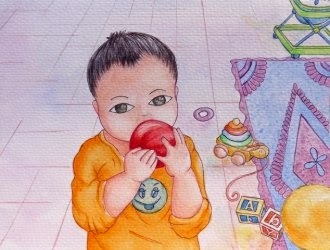Talk to Your Baby
From the moment he is born your baby will start to express himself through crying, making eye contact and by using facial expressions. This early form of communication is your baby's first attempt at language. You can encourage this early stage of your baby’s speech development by talking, singing and reading to him.
Your new baby
will pay more attention to voices talking than to any other sounds. This is because his brain is tuned to pick up the texture, pattern and rhythm of language. But before he can speak himself, he must be able to understand and process information, have the ability to communicate and the physical ability to control the dozens of muscles which are involved in speech. All this takes time and your baby will need your help.
Talk to your baby
Your baby will learn to talk by listening to voices and working out the sounds that make up words, so the more you talk to him the greater the chance he has to pick up words. Some researchers say that the more one-to-one conversations and early games a baby has, the more advanced his language will be by the time he reaches the age of two.

Be a good listener
When your baby coos and babbles at you, make eye contact and stop and listen. When he stops, it's your turn to respond with enthusiasm before pausing and waiting for him to 'talk' back. This will teach him that conversation is a two-way process. Be guided by your baby - he'll make it obvious when he's had enough.
Music, songs and rhymes
These will help your child learn about turn-taking, listening and joining in - all essential skills for communicating. Psychologists believe that music can be of real benefit to babies in the earliest months of their lives when their brain connections are forming. Songs and rhymes often include some physical interaction as well as repetition of words which make them a fun way of learning different sounds.

Sharing books
It's never too early to share books with your baby. Books will help him to develop visual, vocabulary and listening skills. Sitting looking at picture books is a great way to spend some quality time together, so make a point of spending some part of each day sharing a book with your baby and include a bedtime story as part of his bedtime routine.
As your baby gets older he will want to 'read' books by himself so choose books with brightly coloured pictures that are sturdy enough to withstand rough treatment, yet small enough for little hands to hold. Your baby can join the library, free, from birth, which means you'll have a lot of books to choose from.
From the moment he is born your baby will start to express himself through crying, making eye contact and by using facial expressions. This early form of communication is your baby's first attempt at language. You can encourage this early stage of your baby’s speech development by talking, singing and reading to him.
Your new baby
will pay more attention to voices talking than to any other sounds. This is because his brain is tuned to pick up the texture, pattern and rhythm of language. But before he can speak himself, he must be able to understand and process information, have the ability to communicate and the physical ability to control the dozens of muscles which are involved in speech. All this takes time and your baby will need your help.
Talk to your baby
Your baby will learn to talk by listening to voices and working out the sounds that make up words, so the more you talk to him the greater the chance he has to pick up words. Some researchers say that the more one-to-one conversations and early games a baby has, the more advanced his language will be by the time he reaches the age of two.

Be a good listener
When your baby coos and babbles at you, make eye contact and stop and listen. When he stops, it's your turn to respond with enthusiasm before pausing and waiting for him to 'talk' back. This will teach him that conversation is a two-way process. Be guided by your baby - he'll make it obvious when he's had enough.
Music, songs and rhymes
These will help your child learn about turn-taking, listening and joining in - all essential skills for communicating. Psychologists believe that music can be of real benefit to babies in the earliest months of their lives when their brain connections are forming. Songs and rhymes often include some physical interaction as well as repetition of words which make them a fun way of learning different sounds.

Sharing books
It's never too early to share books with your baby. Books will help him to develop visual, vocabulary and listening skills. Sitting looking at picture books is a great way to spend some quality time together, so make a point of spending some part of each day sharing a book with your baby and include a bedtime story as part of his bedtime routine.
As your baby gets older he will want to 'read' books by himself so choose books with brightly coloured pictures that are sturdy enough to withstand rough treatment, yet small enough for little hands to hold. Your baby can join the library, free, from birth, which means you'll have a lot of books to choose from.
